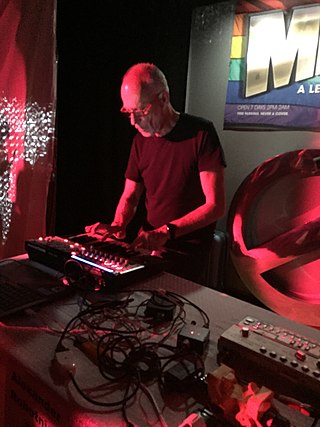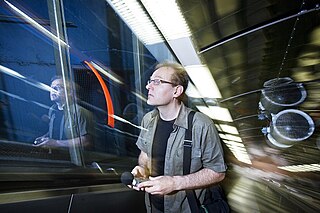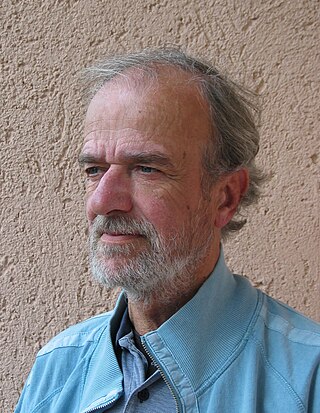
Alessandro Cipriani (born April 28, 1959) is an Italian composer of electronic music. [1]

Alessandro Cipriani (born April 28, 1959) is an Italian composer of electronic music. [1]
Cipriani was born in Tivoli, Italy. After ordinary musical studies Alessandro Cipriani completed his studies in composition and electronic music at the Conservatorio di Santa Cecilia in Rome. He created a number of pieces involving instrumental music with electronic processing, including a string quartet and magnetic tape, entitled "Quadro", [1] [2] and a 60-minute work for piano, percussions and magnetic tape, "Il Pensiero Magmatico" [1] (Magmatic Thought) written in collaboration with Stefano Taglietti. [3] [4] Cipriani then became interested in establishing concrete connections with the music of cultures that are dissimilar to the classical and contemporary western tradition.
A fundamental piece by Cipriani in this context is the trilogy concerning Islamic, Jewish and Gregorian religious chants, composed by the author from 2001 to 2007 in various stereo, quadraphonic and 5.1 versions, both acousmatic and live. [5] [6] [7] [8] In these works Cipriani re-elaborates some traditional chants of these three monotheistic religions, while maintaining a strong connection between the original voice, its comprehensibility and its electronic processing. The three pieces are "Al Nur (The Light)", based on an Islamic chant, "Mimaa'Makim", based on a Jewish chant, and "Aqua Sapientiae/Angelus Domini". [1] [9] [10]
Alessandro Cipriani's collaborations with musicians from various different cultures have led him to reflect on the relationship between local cultures and global culture in relation to electroacoustic music. [11] These reflections were documented in a special issue of the magazine "Organised Sound", edited by Cipriani [12] and they were followed by further collaborations with musicians representing various cultures such as the Sami singer Tuuni Lansman, [13] the Iranian percussionist Mahammad Ghavi-Helm, [14] the Chinese musicians Song Fei and Fan Wei Qing, [15] the Berber performer Nour Eddine Fatty., [16] the South African performers Ann Masina and Dudu Yende, the Ghanaian actress Dorothée Munyaneza, the Korean singer Min Ji Kim, and the Japanese singer Matsutoyo Sato (in the soundtrack of the movie "The Girl from Nagasaki" [17] directed by Michel Comte, which was selected for the 2014 Sundance Film Festival in the "New Frontier" section. [18] )
One of Alessandro Cipriani's most intense collaborations was with the visual artist Alba D' Urbano. [19] Following their meeting, in the eighties, a number of audiovisual works were produced, including 4 videos, 4 video-installations with sound and "Rosa Binaria: Memories", an interactive sound installation on sixteen channels, which was shown at the Leopold-Hoesch-Museum of Düren (Germany). [1] [20]
After a period during which he concentrated on making soundtracks for various documentaries [21] and videos [22] by Giulio Latini and Silvia Di Domenico, in 2001 Cipriani began a long collaboration with the composers of Edison Studio, which led to a variety of collective compositions, in particular the soundtracks of The Last Days of Pompeii , Blackmail by Alfred Hitchcock, Metropolis (1927 film) [23] by Fritz Lang, En Dirigeable sur le Champs de Bataille, L'Inferno , The Cabinet of Dr. Caligari by Robert Wiene and Battleship Potemkin by Sergei Eisenstein. The latter 3 soundtracks have been published on DVD by Cineteca di Bologna, in 2011, [24] 2016 [25] and 2017 [26] in 5.1 surround sound and Stereophonic sound versions in Il Cinema Ritrovato series. [27]
In 2022, Manfredi Edizioni published an art book dedicated to the audiovisual work "Shipwrecks Naufragi" by Alessandro Cipriani and Giulio Latini. The book [28] has been edited by Valentino Catricalà in dual languages (Italian and English). It contains two interviews with Cipriani and Latini and various articles by art critics and musicologists. In 2023 Cipriani and Latini, in collaboration with Alessandro Sbordoni created a multiscreen concert-installation in surround 5.1 titled "Memoria d'Utopie" (Memory of Utopias) first screened at the 60th Nuova Consonanza Festival on 8 December 2023.
Alessandro Cipriani's publications in the field of the teaching of electronic music are of international interest, in particular the textbook "Virtual Sound" [29] written in collaboration with R. Bianchini. [30] [31] His research in the field of education then led him to collaborate with Maurizio Giri. This collaboration resulted in a textbook on sound synthesis and signal processing (based on the Max software) "Electronic Music and Sound Design" Vol.1, [32] Vol.2., [33] and Vol. 3 [34] These textbooks are English translations of the Italian texts "Musica Elettronica e Sound Design" Vol.1, [35] vol.2, [36] and Vol. 3 [37]
Musica Elettronica Viva (MEV) is a live acoustic/electronic improvisational group formed in Rome, Italy, in 1966. Defined as "something of an irregular institution, a band that has come together intermittently through the years", Musica Elettronica Viva's founding members were Allan Bryant, Alvin Curran, Jon Phetteplace and Frederic Rzewski, Richard Teitelbaum. and Carol Plantamura. Other members include Ivan Vandor and Steve Lacy. Garrett List and George E. Lewis subsequently joined the group.

Elisa Toffoli , performing under the mononym Elisa, is an Italian singer-songwriter. She is one of few Italian musicians to write and record mainly in English. She draws inspiration from many genres such as pop, alternative rock, electronica and trip hop. In Europe she is perhaps most recognised for the single "Come Speak to Me", while American audiences may recognise the song "Dancing" as featured in both the 2006 and 2007 seasons of So You Think You Can Dance. On 18 December 2012, her collaboration with Ennio Morricone, "Ancora qui", was featured on Quentin Tarantino's film, Django Unchained and its soundtrack album, which was nominated for a Grammy Award for Best Compilation Soundtrack for Visual Media.

Banco del Mutuo Soccorso is an Italian rock band. A popular progressive rock band in the 1970s, they continued making music in the 1980s and 1990s. They were still active, playing live in 2001 and 2008 at NEARfest. Their charismatic frontman, Francesco Di Giacomo, died in 2014.

Adriana Basile was an Italian composer and singer.

Maurizio Dami, known professionally as Alexander Robotnick, is an Italian electronic musician. He made his debut on the Italian music scene as the founding member of Avida, a dance-cabaret band featuring Daniele Trambusti and Stefano Fuochi.
Fabio Cifariello Ciardi is an Italian composer of acoustic and electroacoustic music.
Pietro Grossi was an Italian composer pioneer of computer music, visual artist and hacker ahead of his time. He began experimenting with electronic techniques in Italy in the early sixties.

Petri Kuljuntausta is a Finnish composer, musician, sound artist and author of three books on electronic music and sound art. Since the 1990s he has belonged to a new generation of composers in Finland interested in experimental and electronic music.

Andrea Liberovici is an Italian composer of contemporary classical music and a theatre director.
Romina Daniele is an Italian exponent of the vocal extended technique, an avant-garde and blues singer, a composer of electronic and experimental music, vocalist and performer associated with contemporary music, writer, photographer. Since 2005, she has been working on sound research in the fields of vocalism and electronic music, and since 2013 she has been working as blues singer as well.
Thema (Omaggio a Joyce) is an electroacoustic composition by Luciano Berio, for voice and tape. Composed between 1958 and 1959, it is based on the interpretative reading of the poem "Sirens" from chapter 11 of the novel Ulysses by James Joyce by Cathy Berberian and on the elaboration of her recorded voice by technological means.

Pino Rucher was an Italian guitarist active in orchestral settings and in film soundtracks.
Edison Studio is a collective of composers and an electroacoustic music ensemble. It was founded in Rome in 1993 by the composers Mauro Cardi, Luigi Ceccarelli, Fabio Cifariello Ciardi e Alessandro Cipriani.
Luigi Ceccarelli is an Italian composer.

Giovanni Fontana is an Italian poet, performance artist, author and publisher.

Pivio and Aldo De Scalzi are two Italian composers, best known for scoring music for television and motion pictures. They are not siblings: Pivio is a pseudonym for Roberto Pischiutta, while Aldo De Scalzi is Vittorio De Scalzi's brother, founding member of New Trolls, an Italian progressive rock band. Aldo himself has written and composed many songs for New Trolls, including "Faccia di Cane", in competition at the popular Italian song contest Sanremo Music Festival in 1985. Moreover, in 1973 Aldo and Vittorio De Scalzi started together their own music studio, Studio G. and the record labels Magma and Grog Records, renowned for having hosted, during the 70s, the most talented bands from progressive rock Italian movement. From 1976 on, Aldo starts playing with the progressive rock band Picchio dal Pozzo.

Giorgio Nottoli is an Italian composer, musician and academic.
Leonello Tarabella is an Italian researcher, musician and composer. His activity runs on the academic/artistic double track.

Alessandro Mannarino, simply known mononymously as Mannarino, is an Italian singer-songwriter.

Mauro Cardi is an Italian composer.